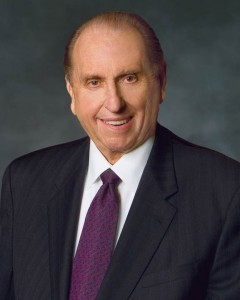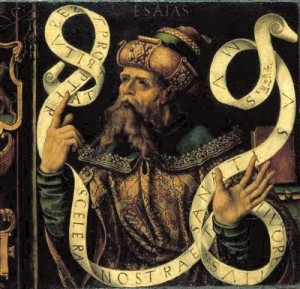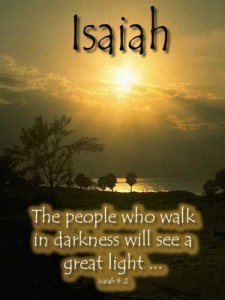Editor’s Note: Unlike his predecessor, sixteenth LDS Church president Thomas S. Monson has regularly declined to be interviewed by newspaper and television reporters during the time of his leadership. Recently, however, Mr. Monson provided access for FOX News correspondent Brian Williams to have an exclusive interview. The following is the transcript of this interview.
 BW: First of all, thank you for allowing me to speak to you, Prophet Monson. People wonder what the life of a prophet is like. Do you mind telling us what you did yesterday?
BW: First of all, thank you for allowing me to speak to you, Prophet Monson. People wonder what the life of a prophet is like. Do you mind telling us what you did yesterday?
TSM: “I officiated as grand chaplain at the installation of the Nauvoo Lodge of Free Masons, at the Grove near the Temple. Grand Master Jonas, of Columbus, being present, a large number of people assembled on the occasion. The day was exceedingly fine; all things were done in order, and universal satisfaction was manifested. In the evening I received the first degree in Free Masonry in the Nauvoo Lodge, assembled in my general business office.”
BW: How about this morning?
TSM: “This morning, I read German and visited with a brother and sister from Michigan, who thought that `a prophet is always a prophet’; but I told them that a prophet is a prophet only when he was acting as such.”
BW: Some people have questioned your position as prophet. What is your response?
TSM: “My enemies say that I have been a true prophet. Why, I had rather be a fallen true prophet than a false prophet. When a man goes about prophesying, and commands men to obey his teachings, he must either be a true or false prophet. False prophets always arise to oppose the true prophets and they will prophesy so very near the truth that they will deceive almost the very chosen ones.”
BW: But some critics say you teach wrong concepts of the Gospel, including at General Conference, where you will speak this weekend.
TSM: “When did I ever teach anything wrong from this stand? When was I ever confounded?”
BW: Well, I’m not sure, but even Prime Minister Benjamin Netanyahu has some doubts.
TSM: “I want to triumph in Israel before I depart hence and am no more seen.”
BW: But didn’t Jesus say you need to be perfect?
TSM: “I never told you I was perfect; but there is no error in the revelations which I have taught.”
BW: Some say you might have a persecution complex. Is that true?
TSM: “Jesus Christ, who was, and is, and is to come, has borne me safely over every snare and plan laid in secret or openly, through priestly hypocrisy, sectarian prejudice, popular philosophy, executive power, or law-defying mobocracy, to destroy me.”
BW: Recently you made some positive comments about Joel Osteen, the popular TV evangelist in Houston. Why do you like him?
TSM: “I did not like the old man being called up for erring in doctrine. It looks too much like the Methodist, and not like the Latter-day Saints. Methodists have creeds which a man must believe or be asked out of their church. I want the liberty of thinking and believing as I please. It feels so good not to be trammeled. It does not prove that a man is not a good man because he errs in doctrine.”
BW: Which scripture do you read the most?
TSM: “For a more particular account I would refer to the Book of Mormon, which can be purchased at Nauvoo, or from any of our Traveling Elders.”
BW: Do you have daily Bible readings with your counselors and the apostles?
TSM: “There are many things in the Bible which do not, as they now stand, accord with the revelations of the Holy Ghost to me.”
BW: There have been some racial issues that took place late last year in Ferguson, Missouri. What is your take on this powder-keg situation?
TSM: “Had I anything to do with the negro, I would confine them by strict law to their own species, and put them on a national equalization.”
BW: Speaking of law, the state of Utah used to shoot death row inmates. Which is better: hanging, shooting, or electrocution?
TSM: “I was opposed to hanging even if a man kill another, I will shoot him, or cut off his head, spill his blood on the ground, and let the smoke thereof ascend up to God; and if ever I ever have the privilege of making a law on that subject, I will have it so.”
BW: Do you believe it’s possible for those committing murder to be forgiven?
TSM: “Remission of sins by baptism was not to be preached to murderers. All the priests of Christendom might pray for a murderer on the scaffold forever, but could not avail so much as a gnat towards their forgiveness. There is no forgiveness for murderers.”
BW: Have you had any prophecies lately in your role as LDS prophet?
TSM: “And now I am prepared to say by the authority of Jesus Christ, that not many years shall pass away before the United States shall present such a scene of bloodshed as has not a parallel in the history of our nation; pestilence, hail, famine, and earthquake will sweep the wicked of this generation from off the face of the land, to open and prepare the way for the return of the lost tribes of Israel from the north country.”
BW: How can a person keep all the commandments, as D&C 25:15 insists must be done? And can breaking those commandments ever be right?
TSM: “But we cannot keep all the commandments without first knowing them, and we cannot expect to know all, or more than we now know unless we comply with or keep those we have already received. That which is wrong under one circumstance, may be, and often is, right under another.”
BW: How often should a person repent? Every single day?
TSM: “Repentance is a thing that cannot be trifled with every day. Daily transgression and daily repentance is not that which is pleasing in the sight of God.”
BW: It has been said you are a University of Utah basketball fan. How did you feel when Duke won and cut down the basketball net at last week’s NCAA Sweet Sixteen game?
TSM: “When you climb up a ladder, you must begin at the bottom, and ascend step by step, until you arrive at the top.”
BW: You have proposed to the Utah legislature a bill requiring sex education to be taught to preteens in Utah’s public schools. Senator Jones’ father, Paul, introduced this bill, even though many legislators oppose it. How would you teach on this subject?
TSM: “Where was there ever a son without a father? And where was there ever a father without first being a son? Whenever did a tree or anything spring into existence without a progenitor? And everything comes in this way. Paul says that which is earthly is in the likeness of that which is heavenly.”
BW: Now that it appears homosexual marriage will become legalized for all the states, including Utah, have you thought about attempting to reinstate polygamy for your people?
TSM: “I have constantly said no man shall have but one wife at a time, unless the Lord directs otherwise.”
BW: Any fear that your church could be wrong about what it believes and teaches to be true?
TSM: “I see no faults in the Church, and therefore let me be resurrected with the Saints, whether I ascend to heaven or descend to hell, or go to any other place. And if we go to hell, we will turn the devils out of doors and make a heaven of it.”
BW: I was talking to another reporter and he told me you are quite the humble man. Comments?
TSM: “I have more to boast of than ever any man had. I am the only man that has ever been able to keep a whole church together since the days of Adam. A large majority of the whole have stood by me. Neither Paul, John, Peter, nor Jesus ever did it. I boast that no man ever did such a work as I. The followers of Jesus ran away from Him; but the Latter-day Saints never ran away from me yet.”
BW: Wait a minute, you sound just like your founder, Joseph Smith!
TSM: Do I? Well, a Happy April Fools to you too!
Final editor’s note: Indeed, all of these quotes come not from Thomas S. Monson but Joseph Smith, as documented below. Did we fool you, even for a little bit? Which quote was your favorite? Tell us in your comments.
Sources:
- “I officiated as grand chaplain…” Joseph Smith, March 15, 1842, History of the Church 4:550-551.
- “This morning, I read German…” Joseph Smith, History of the Church 5:265.
- “My enemies say …” Teachings of the Prophet Joseph Smith, p. 365.
- “I never told you I was perfect …” The quotes from this and the previous two lines all come from Teachings of the Prophet Joseph Smith, p. 368.
- “Jesus Christ, who was, and is,…” Joseph Smith, History of the Church 6:74. See also Susan Easton Black, Setting the Record Straight: Joseph Smith the Mormon Prophet, p. 27.
- “I did not like the old man being called up…” Joseph Smith, History of the Church, 5:340.
- “For a more particular account…” Joseph Smith, History of the Church 4:537-538.
- “There are many things in the Bible…” Teachings of the Prophet Joseph Smith, p. 310. See also History of the Church 5:425.
- “Had I anything to do with the negro…” Joseph Smith, History of the Church 5:217-218
- “I was opposed to hanging…” Joseph Smith, History of the Church 5:296.
- “Remission of sins by baptism…” Discourses of the Prophet Joseph Smith, p. 221.
- “And now I am prepared to say…” Joseph Smith, January 4, 1833, History of the Church 1:315.
- “But we cannot keep all the commandments…” Teachings of the Prophet Joseph Smith, pp. 255-256.
- “Repentance is a thing…” Joseph Smith, History of the Church 3:379. See also Teachings of the Prophet Joseph Smith, p. 148.
- “When you climb up a ladder…” Teachings of the Prophet Joseph Smith, p. 348.
- “Where was there ever a son…” Teachings of the Prophet Joseph Smith, p. 373.
- “I have constantly said…” History of the Church 6:46.
- “I see no faults in the Church…” Teachings of the Prophet Joseph Smith, p. 316.
- “I have more to boast of…” Joseph Smith, History of the Church 6:408-409.
“Myth #1: Mormons believe in a ‘different Jesus.’
 By way of analogy, retired heavyweight boxer George Foreman has five sons – all of them are named George Foreman. Though there are some differences between these five sons (not all have the same mother, for instance), there are many similarities between them. They share a common name, a common father, and common siblings. At least three of them grew up in the same home, went to the same schools, and ate dinner at the same table each night. Yet these are not one George Foreman, but five George Foremans. In spite of them having the same name, and many shared life experiences and attributes, they are different George Foremans.
By way of analogy, retired heavyweight boxer George Foreman has five sons – all of them are named George Foreman. Though there are some differences between these five sons (not all have the same mother, for instance), there are many similarities between them. They share a common name, a common father, and common siblings. At least three of them grew up in the same home, went to the same schools, and ate dinner at the same table each night. Yet these are not one George Foreman, but five George Foremans. In spite of them having the same name, and many shared life experiences and attributes, they are different George Foremans.
 BW: First of all, thank you for allowing me to speak to you, Prophet Monson. People wonder what the life of a prophet is like. Do you mind telling us what you did yesterday?
BW: First of all, thank you for allowing me to speak to you, Prophet Monson. People wonder what the life of a prophet is like. Do you mind telling us what you did yesterday? When the Mormon Seventy answered, he didn’t actually say that Isaiah is his favorite prophet (and I’m fairly certain that he is not), but Elder Deshler seems to hold Isaiah in high esteem. His answer to the question began with a statement straight out of the Mormon proselytizing handbook: “Throughout time, God has called prophets to act as his messenger and make known his will to the people. Additionally, prophets are called to preach righteousness and to testify of Jesus Christ.” Mr. Deshler noted that Isaiah’s teachings include now-fulfilled prophecies about the birth, mission, death and resurrection of Jesus Christ, as well as “powerful truths that are relevant to guide our day-to-day actions toward others and the deity.” These are things like avoiding worldliness, fasting for the poor, and keeping the Sabbath day holy.
When the Mormon Seventy answered, he didn’t actually say that Isaiah is his favorite prophet (and I’m fairly certain that he is not), but Elder Deshler seems to hold Isaiah in high esteem. His answer to the question began with a statement straight out of the Mormon proselytizing handbook: “Throughout time, God has called prophets to act as his messenger and make known his will to the people. Additionally, prophets are called to preach righteousness and to testify of Jesus Christ.” Mr. Deshler noted that Isaiah’s teachings include now-fulfilled prophecies about the birth, mission, death and resurrection of Jesus Christ, as well as “powerful truths that are relevant to guide our day-to-day actions toward others and the deity.” These are things like avoiding worldliness, fasting for the poor, and keeping the Sabbath day holy.